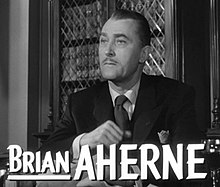Brian Aherne
| Brian Aherne | |
|---|---|
 |
|
| Born |
William Brian de Lacy Aherne 2 May 1902 King's Norton, Worcestershire, England, UK |
| Died | 10 February 1986 (aged 83) Venice, Florida, U.S. |
| Years active | 1924–1967 |
| Spouse(s) |
Joan Fontaine (1939–1945) Eleanor de Liagre Labrot (1946–1986) (his death) |
Brian Aherne (2 May 1902 – 10 February 1986) was an English actor of both stage and screen, who found success in Hollywood.
He was born William Brian de Lacy Aherne in King's Norton, Worcestershire, the son of the Birmingham architect William de Lacy Aherne and his wife Louise née Thomas. Educated at Edgbaston, Birmingham, he also carried out some early stage training at Italia Conti Academy in London and had some child roles before completing his education at Malvern College. He first appeared on the stage in Birmingham with the Pilgrim Players (which subsequently developed into the Birmingham Repertory Theatre), on 5 April 1910, in Fifinella; and made his first appearance on the London stage at the Garrick Theatre, 26 December 1913, in Where the Rainbow Ends, a fairy play by Clifford Mills and John Ramsey, with music by Roger Quilter, which ran at various theatres for over 25 years.
He then studied with a view to becoming an architect, but, having had considerable amateur experience in Birmingham, and with Liverpool's Green Room Club, he obtained an engagement under Robert Courtneidge, and appeared at London's Savoy Theatre, opening on 26 December 1923, as Jack O'Hara in a revival of Paddy the Next Best Thing, the play by W. Gayer-Mackay and Robert Ord (from the novel). He then toured with Violet Vanbrugh as Hugo in The Flame, and appeared at the London Playhouse in May 1924 as Langford in Leon Gordon's White Cargo, in which he played all through 1924–25. In 1926 he accompanied Dion Boucicault, Jr. to Australia, where he appeared in several plays by J.M. Barrie: as Valentine Brown in the comedy Quality Street, John Shand in the comedy What Every Woman Knows, Crichton in The Admirable Crichton, Simon and Harry in Mary Rose; and Willocks in Aren't We All? another comedy by Frederick Lonsdale.
...
Wikipedia
